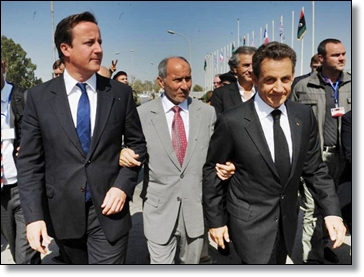The Fall of Colonel Muammar Gaddafi: What Does it Mean for Africa?

 |
|
Cameron, Mustafa and Sarkozy in Tripoli Photo courtesy |
Is Gaddafi the only dictator in Africa? Many countries in Africa, such as Equatorial Guinea, Zimbabwe, Uganda, Gambia, Senegal among others, are all ruled by dictators who are bent on accumulating personal wealth at the expense of their electorate. Citizens who demand change are clobbered, imprisoned and die under unclear circumstances. Why isn’t NATO intervening in these countries? Is NATO’s presence in Libya driven by humanitarian considerations or by other hidden motives?
The war in Libya is a deliberate move by western countries to access Libya’s oil resources. Under Gaddafi, stable Libya used to produce 1.6 million barrels of oil per day, which accounted for 96% of Libya’s exports. This is all now going to be enjoyed by western countries. Libyans who have participated in overthrowing Gaddafi will soon regret as they are driven to serfdom and poverty.
For 42 years, Gaddafi has been the only the African leader who stood tall and ensured that Libya’s oil is used for the development of Libya and its people. He rejected dealings with the World Bank and IMF on grounds that they are agents of western powers out to weaken African economies and prop western puppets in Africa. Now that Gaddafi has been overthrown, there is likely to be no African leader who will interrogate the interests of foreign powers into Africa, for fear of being overthrown.
Gaddafi was compassionate about African unity. During his rule, Libya alone used to contribute 15% of funds to the entire budget of the African union. He at times to used to help other African poor countries, such as Gambia, Uganda, Niger, Burundi e.t.c, pay annual membership subscription to the African Union. Under the leadership of NTC, AU is going to find it hard to carry on its mandate, hence turn to western countries for financial help. Africa will once more find itself driving Western interests.
We are going to witness the emergence of various political groups all over Africa, who will be sponsored by western countries, demanding for unrealistic immediate political reforms which western countries will keep on using to destabilise Africa, intimidate African leaders and exploit African resources with impunity. We shall witness cosmetic democracy all over Africa that is purely western driven in disregard of the local conditions.
The fall of Gaddafi has taught African leaders a lesson that, however strong you are, you cannot intimidate your people forever and go on grooming your son(s) to take over from you. Leaders like Kagame of Rwanda, Wade of Senegal, Paul Biya of Cameroon and Museveni of Uganda, who all along, have been secretly grooming their sons to inherit leadership have now sensed how dangerous this trend is. They have to treat their political rivals with some degree of respect because of fear that they may be supported by western powers to fight them.
In sum, the demand for Africa’s natural resources such as oil, uranium, diamond, Gold e.t.c, in western countries is now higher than ever before and these countries are determined to use their military superiority and financial muscle to increasingly exploit these resources in Africa. African countries need to come up with a strong uniform united voice of how African resources should be exploited and used for the greater benefit of the African citizenry.
By Moses Hategeka.
The author moseswiseman2000@gmail.com is a Ugandan based independent governance researcher, public affairs analyst.
